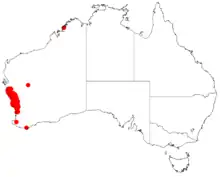Scaevola phlebopetala
Scaevola phlebopetala, commonly known as velvet fanflower, is a herb in the family Goodeniaceae and is endemic to Western Australia.[3]
| Scaevola phlebopetala | |
|---|---|
 | |
| Scientific classification | |
| Kingdom: | Plantae |
| Clade: | Tracheophytes |
| Clade: | Angiosperms |
| Clade: | Eudicots |
| Clade: | Asterids |
| Order: | Asterales |
| Family: | Goodeniaceae |
| Genus: | Scaevola |
| Species: | S. phlebopetala |
| Binomial name | |
| Scaevola phlebopetala | |
 | |
| Occurrence data from Australasian Virtual Herbarium | |
| Synonyms[1] | |
Description
Scaevola phlebopetala is a generally prostrate herb, with stems growing to 50 cm. The stems are bristly, with hairs at 90° and sometimes rough to the touch. The leaves are stalkless and usually toothed with the leaf blade being from 1/2 to 10 cm long by 3 to 17 mm wide. The flowers occur in racemes which are up to 30 cm long. The inflorescence stalk is 2–4.5 cm long and curved. The sepals are linear, 4–14 mm long, and not joined. The corolla is from 10–27 mm long, and has both short, white hairs and long, stiff, yellow hairs on the outside, and is densely bearded on the inside. It is deep purple and yellow in the throat. The fruit is obovoid, striated, warty, hairy and 5–6 mm long. It flowers from June to October.[4]
Distribution and habitat
It is found in southwest Western Australia growing in sandy heaths.[4]
Taxonomy
It was first named and described by Ferdinand von Mueller in 1860.[1][2] The specific epithet, phlebopetala, derives from the Greek, phlebos ("vein")[5] and the Latin, petalum ("petal") to give an adjective describing the plant as having "veined petals".[6]
References
- "Scaevola phlebopetala". Australian Plant Name Index, IBIS database. Centre for Plant Biodiversity Research, Australian Government.
- Mueller, F.J.H. von (1860). "Scaevola phlebopetala". Fragmenta Phytographiae Australiae. 2 (11): 18. Retrieved 26 March 2020.
- "Scaevola phlebopetalae". FloraBase. Western Australian Government Department of Biodiversity, Conservation and Attractions.
- R.C.Carolin, R.C. (2020). "Scaevola phlebopetala". Flora of Australia. Australian Biological Resources Study, Department of Agriculture, Water and the Environment, Canberra. Retrieved 26 March 2020.
- Backer, C.A. (1936). Verklarend woordenboek der wetenschappelijke namen van de in Nederland en Nederlandsch-Indië in het wild groeiende en in tuinen en parken gekweekte varens en hoogere planten (Edition Nicoline van der Sijs). p. 441.
- Stearn, W.T. (2004). Botanical Latin (4 ed.). Timber Press, Oregon. p. 465. ISBN 9780715316436.
.